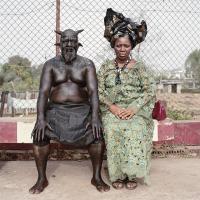 ECAScreening7: Almost from the moment of cinema’s invention, Africa has been inserted into its global system, but on the most unfavorable terms: it has been the dumping ground for second-run “B” movies from Hollywood, Bollywood and Hong Kong, films that are often racist and always estranged from African realities and purposes, while the formidable technical, infrastructural, and capital requirements of making and distributing films made it nearly impossible for Africans to respond in kind with their own films. Because of these steep infrastructural and capital requirements, cinema everywhere depends on state support, and postcolonial African states have proved indifferent, timorous, corrupt, and inept at providing it; the postcolonial African elite has been as philistine as Fanon predicted, without the power or interest to invest in culture (Fanon).
ECAScreening7: Almost from the moment of cinema’s invention, Africa has been inserted into its global system, but on the most unfavorable terms: it has been the dumping ground for second-run “B” movies from Hollywood, Bollywood and Hong Kong, films that are often racist and always estranged from African realities and purposes, while the formidable technical, infrastructural, and capital requirements of making and distributing films made it nearly impossible for Africans to respond in kind with their own films. Because of these steep infrastructural and capital requirements, cinema everywhere depends on state support, and postcolonial African states have proved indifferent, timorous, corrupt, and inept at providing it; the postcolonial African elite has been as philistine as Fanon predicted, without the power or interest to invest in culture (Fanon).
Afroscreen
25.06.2013 | by Jonathan HAYNES